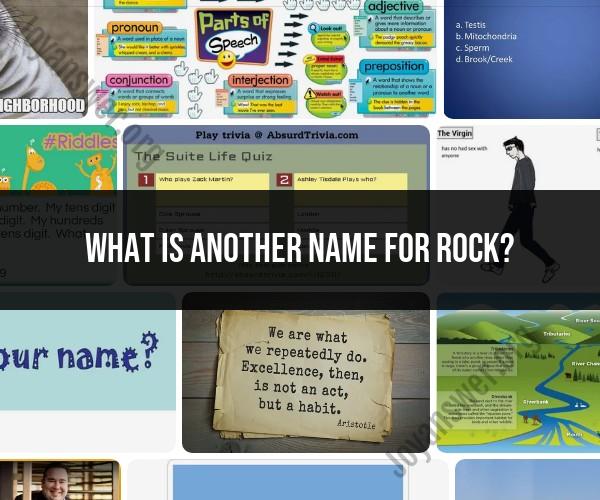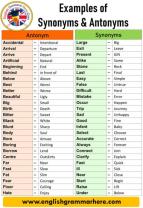What is another name for rock?
There are numerous synonyms and alternative names for "rock," depending on the context and the specific type of rock you're referring to. Here are some synonyms and related terms for "rock":
Stone: A common synonym for rock, especially when referring to solid, naturally occurring mineral materials.
Boulder: A large, rounded or irregularly shaped rock or stone, often found in landscapes or as part of geological formations.
Pebble: A small, smooth, rounded rock, typically found on beaches, riverbanks, or in gravel.
Mineral: A naturally occurring inorganic substance with a specific chemical composition and crystal structure.
Petrified Wood: Wood that has been transformed into stone through a process of fossilization, retaining the appearance of wood but with the properties of rock.
Limestone: A sedimentary rock primarily composed of calcium carbonate, commonly used in construction.
Granite: A coarse-grained, igneous rock composed of quartz, feldspar, and mica, often used for countertops and monuments.
Slate: A fine-grained, metamorphic rock that splits into thin, flat sheets, commonly used for roofing and as a writing surface.
Sandstone: A sedimentary rock composed of sand-sized grains of mineral, often used in building and landscaping.
Marble: A metamorphic rock known for its distinctive veined appearance and often used in sculpture and architecture.
Lava: Molten rock that has erupted from a volcano and cooled to form solid rock.
Igneous Rock: A category of rock formed from the solidification of molten material (magma or lava) and includes rocks like basalt and granite.
Metamorphic Rock: Rock that has undergone a transformation due to high pressure and heat, resulting in changes to its mineral composition and structure.
Cobblestone: A rounded, naturally occurring rock often used for paving streets and walkways.
Geode: A hollow rock with a cavity lined with crystals or other mineral material.
Megalith: A large, prehistoric stone monument, such as Stonehenge.
Crystalline: Used to describe rocks or minerals that have a crystalline structure, such as quartz or amethyst.
Aggregate: A collective term for a mixture of crushed stone, sand, and gravel used in construction.
Rock Formation: Refers to the arrangement and characteristics of rocks in a specific geological setting.
Bedrock: Solid rock beneath surface soils and sediments, forming the Earth's foundation.
The choice of synonym depends on the specific context and the characteristics of the rock being described. Geologists and scientists use precise terminology to categorize and describe different types of rocks based on their mineral composition, texture, and origin.
The three titles you have provided highlight the importance of expanding your vocabulary in geology, especially when it comes to describing rocks. Rocks can be classified in many different ways, and there are many different terms that geologists use to describe them.
Alternative Names for "Rock": Expanding Your Vocabulary in Geology
This title emphasizes the fact that there are many different ways to describe rocks. The term "rock" can be used to refer to any solid mass or aggregate of minerals or mineraloid matter. However, geologists often use more specific terms to describe rocks based on their composition, texture, or origin.
Broadening Your Geological Vocabulary: Synonyms for "Rock"
This title provides a list of synonyms for the word "rock." Some of these synonyms include:
- Stone
- Mineraloid
- Petrological material
- Lithic material
- Igneous rock
- Sedimentary rock
- Metamorphic rock
- Bedrock
- Boulder
- Cobble
- Pebble
- Gravel
- Sand
The Lexicon of Geology: Other Terms for Describing Rocks
This title highlights the fact that geologists have a specialized vocabulary for describing rocks. Some of the terms that geologists use to describe rocks include:
- Compositional terms: These terms describe the minerals that make up a rock. For example, granite is a rock that is composed of quartz, feldspar, and mica.
- Textural terms: These terms describe the size, shape, and arrangement of the minerals in a rock. For example, sandstone is a rock that has a coarse texture because the sand grains are relatively large.
- Origin terms: These terms describe how a rock was formed. For example, igneous rocks are formed when magma cools and solidifies.
Expanding your vocabulary in geology can help you to better understand the science of rocks and to communicate more effectively with other geologists. By learning the different terms that geologists use to describe rocks, you can develop a deeper appreciation for the diversity and complexity of the Earth's rocky crust.













